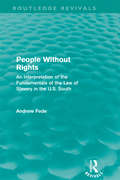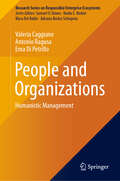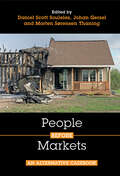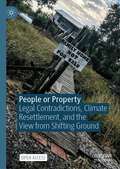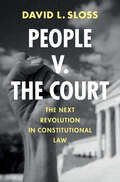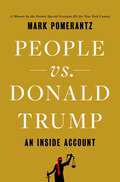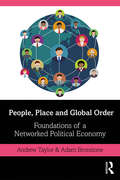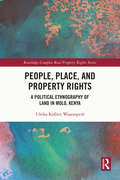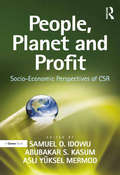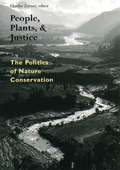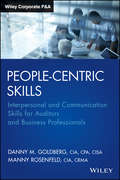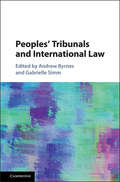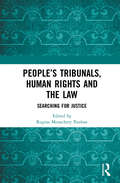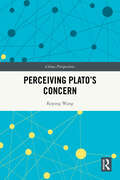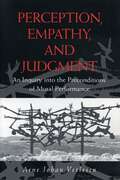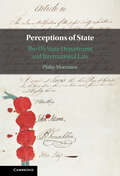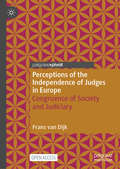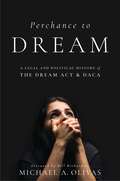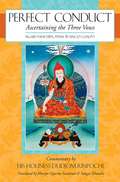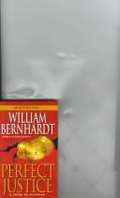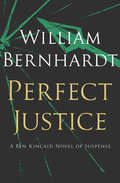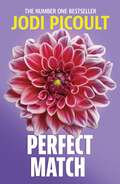- Table View
- List View
People Without Rights: An Interpretation of the Fundamentals of the Law of Slavery in the U.S. South (Routledge Revivals)
by Andrew FedeFirst published in September 1992, the book traces the nature and development of the fundamental legal relationships among slaves, masters, and third parties. It shows how the colonial and antebellum Southern judges and legislators accommodated slavery’s social relationships into the common law, and how slave law evolved in different states over time in response to social political, economic, and intellectual developments. The book states that the law of slavery in the US South treated slaves both as people and property. It reconciles this apparent contradiction by demonstrating that slaves were defined in the law as items of human property without any legal rights. When the lawmakers recognized slaves as people, they burdened slaves with added legal duties and disabilities. This epitomized in legal terms slavery’s oppressive social relationships. The book also illustrates how cases in which the lawmakers recognized slaves as people legitimized slavery’s inhumanity. References in the law to the legal humanity of people held as slaves are shown to be rhetorical devices and cruel ironies that regulated the relative rights of the slaves’ owners and other free people that were embodied in people held as slaves. Thus, it is argued that it never makes sense to think of slave legal rights. This was so even when the lawmakers regulated the individual masters’ rights to treat their slaves as they wished. These regulations advanced policies that the lawmakers perceived to be in the public interest within the context of a slave society.
People and Organizations: Humanistic Management (Research Series on Responsible Enterprise Ecosystems)
by Valeria Caggiano Antonio Ragusa Ema Di PetrilloIn today's world, where the pursuit of profit often takes precedence over the well-being of people and the planet, humanistic management offers a refreshing and much-needed alternative. This book explores the concept of humanistic management as a model for organisations that emphasises individual freedom, dignity and ethics, and presents practical approaches and challenges for implementing it. The author provides a comprehensive overview of the humanistic management approach, exploring its values and principles, as well as the benefits it can bring to companies, employees and society as a whole. Through a combination of theory and case studies, the book offers insights into the cultural and behavioural changes required for organisations to adopt a humanistic approach to management. The book illustrates didactic experiments, social and territorial conjunctures, intellectual and moral postures. Whether you are a business leader, manager or management student, this book is an essential guide for anyone who wants to create a more sustainable and socially responsible organisation. With its clear and insightful analysis of humanistic management, it is sure to inspire and inform readers of all backgrounds and lifestyles.
People before Markets: An Alternative Casebook
by Daniel Scott Souleles Johan Gersel Morten Sørensen ThaningThis innovative volume presents twenty comparative case studies of important global questions, such as 'Where should our food come from?' 'What should we do about climate change?' and 'Where should innovation come from?' A variety of solutions are proposed and compared, including market-based, economic, and neoliberal approaches, as well as those determined by humane values and ethical and socially responsible perspectives. Drawing on original research, its chapters show that more responsible solutions are very often both more effective and better aligned with human values. Providing an important counterpoint to the standard capitalist thinking propounded in business school education, People Before Markets reveals the problematic assumptions of incumbent frameworks for solving global problems and inspires the next generation of business and social science students to pursue more effective and human-centered solutions.
People or Property: Legal Contradictions, Climate Resettlement, and the View from Shifting Ground
by Alessandra Jerolleman Elizabeth Marino Nathan Jessee Liz Koslov Chantel Comardelle Melissa Villarreal Daniel de Vries Simon MandaThis open access book explores the intersection of property law, relocation, and resettlement processes in the United States and among communities that grapple with migration as an adaptation strategy. As communities face the prospect of relocating because of rising seas, policy makers, disaster specialists, and community leaders are scrambling to understand what adaptation pathways are legally possible. While in its ideal application, law functions blindly and without variation, the authors find that legal contradictions come to bear on resettlement processes and place certain communities further in harm’s way. This book will unearth these contradictions in order to understand why successful community-based resettlement has presented such a challenge to communities that are experiencing increasing land deterioration as a result of climate change.
People v. The Court: The Next Revolution in Constitutional Law
by David L. SlossThe Constitution divides power between the government and We the People. It grants We the People an affirmative, collective right to exercise control over the government through our elected representatives. The Supreme Court has abused its power of judicial review and subverted popular control of the government. The Court's doctrine divides constitutional law into rights issues and structural issues. Structural constitutional doctrine ignores the Constitution's division of power between the government and We the People. The Court's rights doctrines fail to recognize that the Constitution grants the People an affirmative, collective right to exercise control over our government. People v. The Court presents an indictment of the Supreme Court's constitutional doctrine. It also provides a set of proposals for revolutionary changes in the practice of judicial review that are designed to enable We the People to reclaim our rightful place as sovereigns in a democratic, constitutional order.
People vs. Donald Trump: An Inside Account
by Mark PomerantzPeople vs. Donald Trump is a fascinating inside account of the attempt to prosecute former president Donald Trump, written by one of the lawyers who worked on the case and resigned in protest when Manhattan&’s district attorney refused to act. Mark Pomerantz was a retired lawyer living a calm suburban life when he accepted an unexpected offer to join the staff of the district attorney of New York County in February 2021 to work on the investigation of former president Donald Trump. The Manhattan DA was interested in Pomerantz because he brought vast experience in litigating white collar and organized crime cases, having worked as a federal prosecutor and a criminal defense attorney for decades. Pomerantz had prosecuted and defended cases involving murder, drug trafficking, political corruption, tax evasion, and financial fraud. His clients had included governors and senators, business leaders, financial institutions, and also gangsters and murderers. Over the next year, Pomerantz investigated the world of Donald Trump and the Trump Organization. He interviewed potential witnesses, scrutinized financial records, and learned everything he could about Trump&’s business practices. The investigation led him to believe that the former president&’s approach to business had much in common with the business practices of another well-known public figure—former mob boss John J. Gotti. Ultimately, Pomerantz gathered enough evidence to support the view—held by many of his colleagues on the case, including former Manhattan district attorney Cyrus Vance Jr.—that former president Donald Trump should be indicted for a number of financial crimes. But that indictment never happened. This book explains why. Pomerantz&’s work ultimately led to the indictment of the Trump Organization and Allen Weisselberg, the chief financial officer of the Trump Organization, who pleaded guilty to tax fraud. But that indictment was merely the prelude to a larger criminal case that Pomerantz urged the Manhattan DA, Alvin Bragg, to bring against Donald Trump. When the DA refused to authorize that prosecution, Pomerantz and his colleague Carey Dunne resigned. Aspects of the case Pomerantz wanted to bring are currently being pursued against Trump by the attorney general of New York State in a civil fraud case that does not involve criminal penalties. In People vs. Donald Trump, Pomerantz tells the story of his unprecedented investigation, why he believes Donald Trump should be prosecuted, and what we can learn about the nature of justice in America from this extraordinary case. Pomerantz draws from a lifetime of legal experience to tell a devastating and frequently entertaining story of how prosecutors think, how criminals act, and how our justice system works—and sometimes doesn&’t work. Pomerantz has written a cautionary tale that illuminates the challenges of prosecuting Donald Trump, why Trump manages to dance between the raindrops of accountability, and how others might bring him to justice.
People, Place and Global Order: Foundations of a Networked Political Economy
by Andrew Taylor Adam BronstoneGlobalization and technology are combining to change socio-economic relationships. The pace of change and uncertainty of the world of work – no job for life, zero-hours contracts, diminished pension rights and a growing delivery dependence on digital networks over human contact – are creating a profound unease that may be unprecedented in the Western world. If organizational patterns are not sufficiently adjusted and businesses continue as usual, we run the risk of alienating entire groups within society with many feeling ‘left behind’. Using deliberately accessible language for students and the general reader, the authors draw upon socially innovative models of economic organization from the nineteenth century to present a model to master this new economy for the common good. The book illustrates, with practical examples, how digital networks can be leveraged and provides a common checklist to identify suitable conditions for organizations to flourish and provide the means to more effectively evaluate opportunities.
People, Place and Property Rights: A Political Ethnography of Land in Molo, Kenya (Routledge Complex Real Property Rights Series)
by Ulrika Kolben WaaranperäFor more than a century, property rights to land in Molo in the Kenyan highlands have been subjected to diverse reforms and desires. Colonial and independent state administrations have restructured land tenure systems to establish and maintain authority or alleviate landlessness. Meanwhile, people on the ground have developed their own ideas about property rights, place, and people. Via a detailed political ethnography, Ulrika Kolben Waaranperä uncovers the heterodox notion of property rights that has emerged as land has been redistributed, settlement schemes established, electricity lines drawn, and electoral violence mobilized. The book makes an important contribution to the study of land and politics in Kenya and beyond by drawing attention to how conceptions of property rights are shaped by and constitutive of relations of belonging and authority. This relational view challenges the universal definition of property rights undergirding most contemporary land reforms. Instead, property rights are situated within the political and rendered legible for both definitional and distributional debates. In effect, land reform is posited as a fundamentally political undertaking.
People, Planet and Profit: Socio-Economic Perspectives of CSR
by Samuel O. Idowu Abubakar S. KasumIt is no longer the case that it’s only society which benefits from CSR actions. A corporation actually helps itself when operating sustainably and does well because of its triple bottom line actions. The editors of People, Planet and Profit believe that whilst Corporate Social Responsibility is by now a familiar concept to academics or practitioners, insufficient attention has been paid to the end product of CSR in practice, which they define in terms of social and economic developmental effect. The contributions in this edited volume explain the developmental aspect of CSR from a conceptual perspective and provide empirical evidence of the impact of CSR delivery on stakeholders in different corners of the World. The emphasis is on what corporations take from and give back to their stakeholders whilst trying to behave in a corporately responsible fashion. Stakeholders, including employees, customers, host communities, governments and NGOs have diverse interests and expectations of CSR. This gives rise to questions about whether the activities corporations support are the ones today’s stakeholders need; whether the CSR programmes being delivered are adequate; and about the relationship between the corporations’ view of what constitutes CSR and that of the supposed beneficiaries. This book offers thoughtful answers to these questions and assesses the outcomes of corporate activities both in developed and developing countries and regions, in terms of economic progress and social and political advancement.
People, Plants, and Justice: The Politics of Nature Conservation
by Charles ZernerIn an era of market triumphalism, this book probes the social and environmental consequences of market-linked nature conservation schemes. Rather than supporting a new anti-market orthodoxy, Charles Zerner and colleagues assert that there is no universal entity, "the market." Analysis and remedies must be based on broader considerations of history, culture, and geography in order to establish meaningful and lasting changes in policy and practice.Original case studies from Asia, Latin America, Africa, and the South Pacific focus on topics as diverse as ecotourism, bioprospecting, oil extraction, cyanide fishing, timber extraction, and property rights. The cases position concerns about biodiversity conservation and resource management within social justice and legal perspectives, providing new insights for students, scholars, policy professionals and donor/foundations engaged in international conservation and social justice.
People-Centric Skills: Interpersonal and Communication Skills for Auditors and Business Professionals (Wiley Corporate F&A)
by Danny M. Goldberg Manny RosenfeldBusiness Professionals, to be Truly Effective and Advance in their Careers, Must Master their People-Centric Skills. People-Centric Skills: Interpersonal and Communication Skills for Auditors and Business Professionals is a comprehensive guide to the "soft skills" that make technical professionals more effective. People-Centric Skills aim to improve all aspects of personal interactions, relationship development, and communication. These skills are as essential to success as are technical capabilities. This is the story of a leading internal audit department taking that next step to becoming a world-class audit organization in a fictional company. The foundation of that next step is developing their People-Centric Skills. The book demonstrates the impact that interpersonal and communication skills – whether good or bad – have on an auditor's effectiveness, job, and career. Readers will be able to empathize with the characters, and relate to the real-life situations in which they find themselves. Each chapter features a summary of key People-Centric points and guidelines that will help readers apply what they've learned to their own projects and departments. In a 2013 study sponsored by the Institute of Internal Auditors ("IIA"), the seven key attribute areas identified to be a successful auditor include relationship building, partnering, communications, teamwork, diversity, continuous learning and integrity. Unfortunately, most professionals never obtain these skills as part of their college degrees, certifications and other ongoing training. They are left to their own devices when it comes to developing these talents. The book follows an easy-to-read fictional narrative to highlight areas for improvement, and uses common scenarios to illustrate how to apply the lessons. People-Centric Skills: Interpersonal and Communication Skills for Auditors and Business Professionals focuses on many of these critical attributes. Topics include: Conflict Management Coaching and Mentoring Building an Effective Team and Team Dynamics Team Leadership Partnering and Relationship Building Effective Meeting Practices Brainstorming and Multivoting Assessing Corporate Culture Active Listening Non-verbal Communications Consensus Building These skills apply not only to internal auditors but also transfer across a broad range of business professions and industries, and from professional to personal life. They open doors, establish effective relationships, improve effectiveness, and can turn a "no" into a "yes." They are the true differentiator in advancing a career. For an auditor to be truly effective, great people skills are one of the most important tools in the box. People-Centric Skills: Interpersonal and Communication Skills for Auditors and Business Professionals is a straightforward guide to getting along, getting what you want in a constructive manner, and becoming a world-class professional.
Peoples’ Tribunals and International Law
by Gabrielle Simm Andrew ByrnesPeoples' Tribunals and International Law is the first book to analyse how civil society tribunals implement and develop international law. With contributions covering tribunals in Europe, Latin America and Asia, this edited collection provides cross-disciplinary academic and activist perspectives and unique insights into the phenomenon of peoples' tribunals. Written by academics in law, anthropology and international relations, it also incorporates the reflections of civil society activists and advocates on peoples' tribunals. The collection includes chapters ranging from the Permanent Peoples' Tribunal, successor to the Bertrand Russell Tribunal established to question the legality of the Vietnam War, to recent tribunals addressing atrocities in Soeharto's Indonesia and violations against migrants in Europe. Peoples' Tribunals and International Law offers the first sustained analysis of the different approaches to international law in tribunal proceedings. It will interest scholars of law, criminology, human rights, politics, sociology, anthropology and international relations.
People’s Tribunals, Human Rights and the Law: Searching for Justice
by Regina PaulosePeople’s Tribunals are independent, peaceful, grassroots movements, created by members of civil society, to address impunity that is associated with ongoing or past atrocities. As such, they offer society an alternative history and create a space for healing and reconciliation to take place that may otherwise be stifled by political agendas and legal technicalities. Since the 1960’s, People’s Tribunals have grown and developed to address many kinds of situations, from genocide to environmental degradation. This book presents a balance of academic and practitioner perspectives on People’s Tribunals. It explores key questions relating to their formation and roles and discusses what they can offer to victims and survivors. The volume provides an introduction to the subject, theoretically informed discussion reflecting different perspectives, and a range of contributions focusing on different types of People’s Tribunals and various aspects of their operation. The authors analyse advantages and disadvantages of these movements in a variety of contexts. The impact and contribution they have in the international criminal law and international human rights context is also discussed. The book will be welcomed by those interested in international criminal law, human rights, environmental justice, transitional justice and international relations.
Perceiving Plato's Concern (China Perspectives)
by Keping WangThis book mainly delves into the practical moral poetics in Plato's late masterpiece, the Laws, and applies a comparative approach to Plato's philosophizing and the Chinese way of thinking in the domains of art-making, cultivating a good life, and music-poetry education.Plato's main concern is psychic and correct education as the foundation of character building, coupled with the development of ideal guardians or perfect citizens. Such education requires a suitable use of allegories, myths, and poems, because it involves not only youngsters but also non-philosophers. Saturated with poetic wisdom, it enhances philosophical learning and human becoming in effect and sheds light on how to live a worthwhile life in praxis.What is discussed herein will interest students and scholars of ancient Greek philosophy, classical studies, art theory, Chinese thought and poetry education, among others.
Perception, Empathy, and Judgment: An Inquiry into the Preconditions of Moral Performance (G - Reference, Information and Interdisciplinary Subjects)
by Arne Johan VetlesenIn Perception, Empathy, and Judgment Arne Johan Vetlesen focuses on the indispensable role of emotion, especially the faculty of empathy, in morality. He contends that moral conduct is severely threatened once empathy is prevented from taking part in an interplay with cognitive faculties (such as abstraction or imagination) in acts of moral perception and judgment. Drawing on developmental psychology, especially British "object relations" theory, to illuminate the nature and functioning of empathy, Vetlesen shows how moral performance is constituted by a sequence involving perception, judgment, and action, with an interplay between the agent's emotional (empathic) and cognitive faculties occurring at each stage. In the powerful tradition from Kant to present-day theorists such as Kohlberg, Rawls, and Habermas, reason is privileged over feeling and judgment over perception, in such a way that basic philosophical questions remain unasked. Vetlesen focuses our attention on these questions and challenges the long-standing assertion that emotions are damaging to moral response. In the final chapter he relates his argument to recent feminist critiques that have also castigated moral theorists in the Kantian tradition for their refusal to recognize a role for emotion in morality. While the book's argument is philosophical, its method and scope are interdisciplinary. In addition to critiques of such philosophers as Arendt, MacIntyre, and Habermas, it contains discussions of specific historical, ideological, and sociological factors that may cause "numbing"—selective or broad-ranging, pathological insensitivity—in humans. The Nazis' mass killing of Jews is studied to illuminate these and other relevant empirical aspects of large-scale immoral action.
Perceptions of State: The US State Department and International Law
by Philip MoremenWhy, and to what extent, are states more or less likely to comply with international law? No overarching state compels compliance, and the international institutional context is thin, yet states seem largely to comply. How do we explain this behaviour? Developed through interviews with eighty State Department senior officials from across five recent administrations, Philip Moremen provides a qualitatively and quantitatively rich study of the extent to which and under what conditions the United States and other countries comply with international law. US policymakers consider legal issues, national interest, and other factors together when making decisions-law is not always dispositive. Nevertheless, international law constrains states. In State Department policymaking there is a strong culture of respect for international law, and lawyers play a highly influential role. In this context, the book concludes by investigating the effect of the Trump Administration on the culture and processes of the State Department.
Perceptions of the Independence of Judges in Europe: Congruence of Society and Judiciary
by Frans van DijkThis open access book is about the perception of the independence of the judiciary in Europe. Do citizens and judges see its independence in the same way? Do judges feel that their independence is respected by the users of the courts, by the leadership of the courts and by politicians? Does the population trust the judiciary more than other public institutions, or less? How does independence of the judiciary work at the national level and at the level of the European Union? These interrelated questions are particularly relevant in times when the independence of the judiciary is under political pressure in several countries in the European Union, giving way to illiberal democracy. Revealing surveys among judges, lay judges and lawyers - in addition to regular surveys of the European Commission - provide a wealth of information to answer these questions. While the answers will not please everyone, they are of interest to a wide audience, in particular court leaders, judges, lawyers, politicians and civil servants.
Perchance to DREAM: A Legal and Political History of the DREAM Act and DACA (Early American Places)
by Bill Richardson Michael A OlivasThe first comprehensive history of the DREAM Act and Deferred Action for Childhood Arrivals (DACA)In 1982, the Supreme Court of the United States ruled in Plyler v. Doe that undocumented children had the right to attend public schools without charge or impediment, regardless of their immigration status. The ruling raised a question: what if undocumented students, after graduating from the public school system, wanted to attend college? Perchance to DREAM is the first comprehensive history of the DREAM Act, which made its initial congressional appearance in 2001, and Deferred Action for Childhood Arrivals (DACA), the discretionary program established by President Obama in 2012 out of Congressional failure to enact comprehensive immigration reform. Michael A. Olivas relates the history of the DREAM Act and DACA over the course of two decades.With the Trump Administration challenging the legality of DACA and pursuing its elimination in 2017, the fate of DACA is uncertain. Perchance to DREAM follows the political participation of DREAMers, who have been taken hostage as pawns in a cruel game as the White House continues to advocate anti-immigrant policies. Perchance to DREAM brings to light the many twists and turns that the legislation has taken, suggests why it has not gained the required traction, and offers hopeful pathways that could turn this darkness to dawn.
Perfect Conduct
by Gyurme Dorje Dudjom Rinpoche Pema Wangyi Gyalpo Sangye Khandro Khenpo Gyurme SamdrubAll religions teach codes of ethical behavior. So too does Buddhism. This books is a translation of an indispensable exposition of the three sets of vows that are central to Tibetan Buddhist codes of discipline--the pratimoksa vows of individual liberation; the vows of the bodhisattva, who selflessly strives for the liberation of all beings; the vows of the esoteric path of tantra. Here, the late Dudjom Rinpoche provides his authoritative commentary on the role of ethics and morality in Buddhist practice, outlining in detail the meaning and scope of the vows, and giving practical advice on maintaining the vows as supportive tools in the journey toward enlightenment.
Perfect Conduct
by Gyurme Dorje Dudjom Rinpoche Pema Wangyi Gyalpo Sangye Khandro Khenpo Gyurme SamdrubAll religions teach codes of ethical behavior. So too does Buddhism. This books is a translation of an indispensable exposition of the three sets of vows that are central to Tibetan Buddhist codes of discipline--the pratimoksa vows of individual liberation; the vows of the bodhisattva, who selflessly strives for the liberation of all beings; the vows of the esoteric path of tantra. Here, the late Dudjom Rinpoche provides his authoritative commentary on the role of ethics and morality in Buddhist practice, outlining in detail the meaning and scope of the vows, and giving practical advice on maintaining the vows as supportive tools in the journey toward enlightenment.
Perfect Conduct
by Ngari Panchen Pema WangyigalpoAll religions teach codes of ethical behavior. So too does Buddhism. This books is a translation of an indispensable exposition of the three sets of vows that are central to Tibetan Buddhist codes of discipline--the pratimoksa vows of individual liberation; the vows of the bodhisattva, who selflessly strives for the liberation of all beings; the vows of the esoteric path of tantra. Here, the late Dudjom Rinpoche provides his authoritative commentary on the role of ethics and morality in Buddhist practice, outlining in detail the meaning and scope of the vows, and giving practical advice on maintaining the vows as supportive tools in the journey toward enlightenment.
Perfect Justice (Ben Kincaid Series #4)
by William BernhardtHate among townspeople and recent Vietnamese arrivals sparks trouble for lawyer Ben.
Perfect Justice (The Ben Kincaid Novels #4)
by William BernhardtA defense lawyer&’s newest client is a racist—but is he a killer? &“Bernhardt keeps his readers coming back for more&” (Library Journal). For Ben Kincaid, the forests of Arkansas are a place to escape the hubbub of the courtroom and enjoy the outdoors. But for the thousands of Vietnamese refugees who came through this backwoods area in the mid-1970s, the Ouachita Mountains were a place to begin their new life in the United States. And for Tommy Vuong, an activist among the American-born Vietnamese, the woods are a place to die. When Vuong is found stabbed through the neck beneath a burning cross, the logical suspect is Donald Vick, a member of a local white supremacist hate group who was seen fighting with Vuong the previous day. No lawyer in the county will take Vick&’s case, but Kincaid can&’t refuse. His new client is sullen, hateful, and demands to plead guilty—even though there&’s no evidence linking him to the crime scene. No matter what it takes, Kincaid will bring justice to the backwoods, whether the inhabitants like it or not.
Perfect Match
by Jodi PicoultTHE INTERNATIONAL BESTSELLER'A gut-wrenching tale of mother love . . . contains enough blind alleys and red herrings to keep even the most astute readers on their toes' Daily ExpressAs a career-driven Assistant District Attorney, Nina Frost's life is dedicated to balancing being a mother to five-year old son Nathaniel and seeking justice to keep those who commit the most unthinkable of all crimes behind bars.But this delicate balance is upset when Nina and husband Caleb find out that Nathaniel has fallen victim to the same crime she strives to fight.Broken and angry, Nina is determined to seek justice for her son. But as her desire for vengeance drives her to the brink, the lines between justice and crime threaten to blur forever. . .From the internationally bestselling author comes a complex and masterful tale of motherly love.THE BOOK OF TWO WAYS, Jodi's stunning new novel about life, death and missed opportunities is available to pre-order now.
Perfect Match: Perfect Match, Second Glance, And My Sister's Keeper
by Jodi PicoultWhat does it mean to be a good mother? For career-driven assistant district attorney Nina Frost, the question inspires pangs of guilt familiar to all parents torn by the demands of home and office. But whereas most parents lie awake at night vividly conjuring the worst scenarios that could befall their children in their absence, Nina lives the reality of such crises -- and it's her job to do something about them. Nina Frost prosecutes child molesters -- and in the course of her everyday work, she has endured the frustration of seeing too many criminals slip through the system and walk free. A man as methodical and careful as his wife is instinctive and mercurial, Caleb Frost is a stonemason who glories in his ability to construct with his own hands the physical barriers that will keep out the unwanted -- and protect all that is precious within. But even the strongest walls cannot guard Nina and Caleb from the shattering discovery that their own beloved son has been sexually abused. Five-year-old Nathaniel is the only one who knows the identity of his assailant -- but in the initial fallout of his trauma, he's been left mute, unable to speak a single word. Knowing the futility of trusting the courts to exact justice for Nathaniel, and ripped apart by a maddening sense of helplessness, Nina finds herself in a grip of rage she can't deny -- no matter the consequence, whatever the sacrifice. What does it take to be a good mother? How far can a person go...and still live with herself? What happens if one's absolute truths and convictions are turned upside down? Forging new ground in her unique territory of morally complex suspense fiction, bestselling author Jodi Picoult delivers her most soulful and intimate novel to date -- and portrays what happens to a family when a wheel comes off, when the domestic unit begins to careen and veer, when the vestments of ordinary life are forfeited to unspeakable horrors. From its provocative opening to the astonishing and revelatory finale, Perfect Match enters the raw and private realm of a parent's heart, and ultimately questions our assumptions about family, security, and love.
